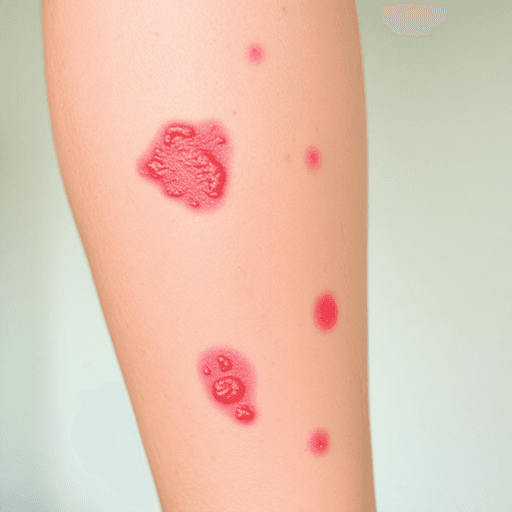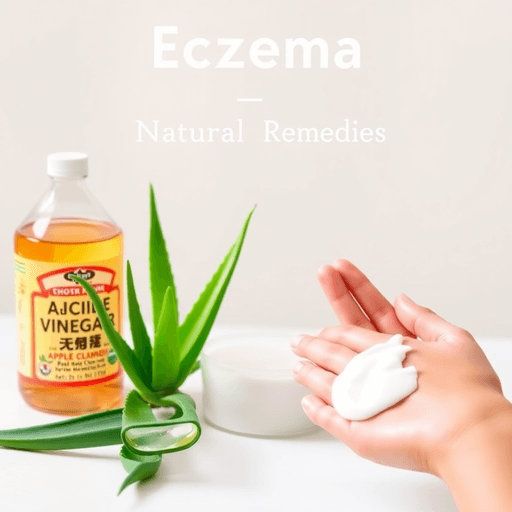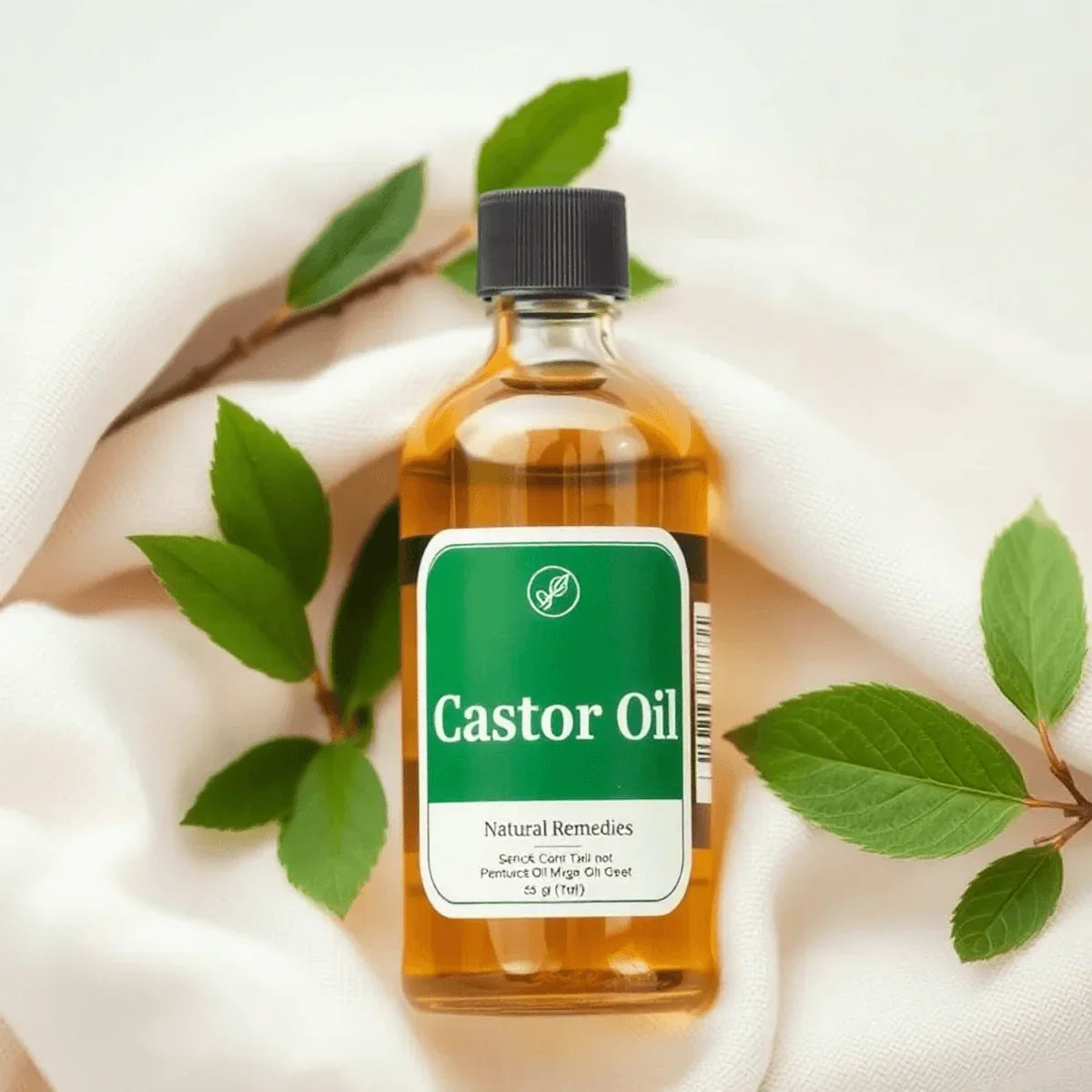Can Castor Oil Help with Eczema? Here's What You Need to Know

Introduction
Living with eczema can feel like a constant battle against your own skin. This chronic condition affects millions worldwide, causing patches of red, itchy, and inflamed skin that can significantly impact daily life.
As the search for effective treatments continues, many people are turning to natural remedies - and castor oil has emerged as a promising option. This thick, golden oil, extracted from castor beans, has gained attention for its potential to soothe and heal irritated skin.
What makes castor oil interesting for eczema sufferers?
- Rich in anti-inflammatory compounds
- Deep moisturising properties
- Natural healing capabilities
- Readily available and affordable
You might wonder if castor oil could be the solution you've been looking for. While traditional treatments remain essential, understanding the potential benefits of castor oil for eczema management can open new possibilities for your skincare routine.
This guide explores the science behind castor oil's effectiveness, proper application methods, and safety considerations - helping you make an informed decision about incorporating this natural remedy into your eczema care plan.
Understanding Eczema
Eczema affects up to 15% of people worldwide, manifesting as patches of red, itchy, and inflamed skin. This chronic condition appears in several distinct forms:
1. Atopic Dermatitis
The most common type, often running in families. For a deeper understanding of this condition, check out our article on Atopic Eczema and Dermatitis.
2. Contact Dermatitis
Triggered by direct contact with irritants.
3. Dyshidrotic Eczema
Characterised by small blisters on hands and feet.
4. Nummular Eczema
Presents as circular patches on the skin.
Key Symptoms:
- Dry, scaly patches
- Intense itching
- Redness and inflammation
- Skin thickening
- Small, fluid-filled blisters
- Cracking or bleeding skin
Your eczema symptoms might worsen due to specific triggers:
Common Triggers:
- Environmental allergens (dust mites, pollen)
- Harsh soaps and detergents
- Temperature changes
- Stress and anxiety
- Certain fabrics (wool, synthetic materials)
- Food allergies
- Hormonal changes
A consistent skincare routine plays a vital role in managing eczema symptoms. Your skin needs regular moisturising to maintain its protective barrier. Using gentle, fragrance-free products helps prevent flare-ups.
For effective management strategies, consider using products specifically designed for eczema relief. Our range includes eczema body wash and eczema cream that are made from 95% natural ingredients and suitable for all ages. These products can help provide relief from atopic Dermatitis, psoriasis, and dry skin.
Recording your triggers and symptoms in a diary can help identify patterns and develop effective management strategies.
What is Castor Oil?
Castor oil is derived from the seeds of the Ricinus communis plant, which is indigenous to the tropical regions of Africa and Asia. The oil is extracted through a process called cold-pressing, where the seeds are pressed without any heat, ensuring that the oil retains its beneficial properties. The result is a thick, pale yellow liquid with a distinctive smell.
The Unique Composition of Castor Oil
What makes castor oil special is its chemical makeup. Unlike other plant oils, castor oil contains a high concentration of ricinoleic acid, an omega-9 fatty acid that is quite rare. This fatty acid accounts for up to 90% of the oil's composition and gives it unique properties.
Benefits of Ricinoleic Acid
Ricinoleic acid has several benefits for the skin:
- Anti-inflammatory properties - helps reduce redness and swelling
- Antimicrobial effects - combats potential skin infections
- Moisturising capabilities - forms a protective barrier on the skin
Other Beneficial Compounds in Castor Oil
In addition to ricinoleic acid, castor oil also contains other beneficial substances:
- Vitamin E - known for its antioxidant properties
- Minerals - such as zinc and magnesium
- Other fatty acids - including oleic and linoleic acids
These compounds work synergistically to create a powerful natural remedy.
How Castor Oil Works for Eczema-Prone Skin
The molecular structure of castor oil allows it to penetrate deep into the layers of the skin. This deep absorption delivers its beneficial components directly to where they are needed most.
For individuals with eczema-prone skin, this deep penetration is particularly advantageous. It helps provide hydration and soothing elements to inflamed areas, addressing one of the main challenges in managing eczema.
The Moisturising Effect of Castor Oil
The thick consistency of castor oil forms a protective layer on the surface of your skin. This barrier effect helps seal in moisture and prevent water loss - both crucial factors in maintaining healthy, hydrated skin.
By incorporating castor oil into your skincare routine, you can potentially enhance your body's natural moisture retention abilities, making it an excellent addition for those dealing with dry or eczema-prone skin conditions.
How Castor Oil Works on Eczema
Castor oil's effectiveness in managing eczema stems from its active compound, ricinoleic acid. This powerful component penetrates deep into the skin layers, creating a protective barrier that locks in moisture and shields against environmental triggers.
The oil's mechanism of action targets three key areas:
- Skin Barrier Protection: Ricinoleic acid forms a protective film over affected areas, preventing moisture loss and reducing the impact of external irritants that trigger eczema flare-ups.
- Deep Hydration: The oil's thick consistency delivers intense moisturisation to dry, flaky patches. Its unique molecular structure allows it to penetrate multiple skin layers, providing long-lasting hydration where standard moisturisers might fall short.
- Inflammation Control: Research suggests ricinoleic acid possesses natural anti-inflammatory properties that help calm irritated skin. This action can reduce:
- Redness
- Swelling
- Itching sensations
- Heat in affected areas
The oil's antimicrobial properties add another layer of protection by helping prevent secondary infections - a common complication when eczema-prone skin becomes compromised through scratching.
Your skin's pH balance also benefits from castor oil application. The oil helps maintain optimal skin acidity levels, creating an environment where healthy skin cells can regenerate whilst keeping harmful bacteria at bay.
Research on Castor Oil and Eczema
Scientific research on castor oil's effectiveness for eczema remains limited, with most studies focusing on its broader applications in skin care and wound healing. Here's what current research tells us:
Clinical Studies
- A 2017 study in the Journal of Ethnopharmacology demonstrated castor oil's anti-inflammatory properties, suggesting potential benefits for inflammatory skin conditions
- Research published in the International Journal of Molecular Sciences highlighted castor oil's ability to enhance skin barrier function - a crucial factor in eczema management
Comparative Research
Traditional eczema treatments like topical corticosteroids show more substantial clinical evidence:
- Topical steroids: 70-80% success rate in managing acute flare-ups
- Castor oil: Limited clinical data, primarily supported by anecdotal evidence
Laboratory Findings
Recent lab studies reveal castor oil's promising properties:
- Antimicrobial activity against common skin pathogens
- Enhanced wound healing capabilities
- Increased collagen production
Research Gaps
The scientific community acknowledges several areas requiring further investigation:
- Long-term effects of castor oil use on eczema-prone skin
- Optimal concentration levels for treatment
- Potential interactions with conventional eczema medications
While research supports castor oil's beneficial properties for skin health, direct studies linking it to eczema treatment remain sparse. Medical professionals recommend using it as a complementary treatment alongside proven eczema management strategies.
Application Methods for Using Castor Oil on Eczema-Prone Skin
Applying castor oil correctly can make a significant difference in managing your eczema symptoms. Here's how to use it effectively:
1. Direct Application Method
- Clean your hands thoroughly
- Pour a small amount of castor oil onto a cotton ball or pad
- Gently dab the oil onto affected areas
- Use light, circular motions to massage the oil into your skin
- Allow 15-20 minutes for absorption
2. Dilution Method
- Mix castor oil with a carrier oil (1:1 ratio)
- Recommended carrier oils:
- Coconut oil
- Jojoba oil
- Sweet almond oil
- Apply the mixture using clean fingertips
Best Practices
- Always perform a patch test 24 hours before full application
- Apply the oil to damp skin after bathing
- Use only cold-pressed, hexane-free castor oil
- Store in a dark, cool place to maintain effectiveness
Application Frequency
- Start with once-daily application
- Increase to twice daily if skin responds well
- Reduce frequency if irritation occurs
Essential Safety Tips
- Never apply undiluted castor oil to broken or severely inflamed skin
- Avoid contact with eyes and mucous membranes
- Stop use immediately if you experience increased redness or irritation
- Clean application tools regularly to prevent bacterial contamination
Possible Side Effects and Considerations When Using Castor Oil for Eczema Management
Castor oil can trigger adverse reactions in some individuals, particularly those with sensitive skin conditions. Here are key side effects to watch for:
- Skin irritation: Redness, burning sensation, or increased itching
- Contact dermatitis: Development of rashes or hives at application sites
- Allergic responses: Swelling, severe itching, or difficulty breathing in rare cases
A patch test is essential before applying castor oil to larger areas:
- Apply a small amount of diluted castor oil to your inner forearm
- Cover the area with a bandage
- Wait 24 hours
- Check for any adverse reactions
If you experience any negative reactions during the patch test, discontinue use immediately and seek medical advice. People with severe eczema or compromised skin barriers should exercise extra caution when using castor oil.
Safety Tips:
- Start with diluted applications (mix with a carrier oil)
- Avoid applying to broken skin or open wounds
- Use organic, cold-pressed castor oil to minimise risk of contamination
- Stop use if symptoms worsen
Castor Oil for Babies with Eczema: Is It Safe?
Babies' skin requires special attention when treating eczema with castor oil. Their delicate skin barrier makes them particularly sensitive to topical treatments, including natural remedies.
Essential Safety Guidelines for Baby Eczema Treatment:
- Use only cold-pressed, hexane-free castor oil
- Dilute castor oil with gentle carrier oils like coconut or jojoba oil (1:3 ratio)
- Apply to a small test area for 24 hours before full application
- Avoid using on broken or severely irritated skin
- Stop use immediately if any irritation occurs
Your paediatrician's guidance is crucial before introducing castor oil into your baby's skincare routine. They can assess your baby's specific eczema triggers and recommend appropriate treatment methods.
Signs to Watch For:
- Increased redness
- New rashes
- Skin warmth
- Changes in your baby's behaviour
- Scratching or discomfort
Many parents seek natural alternatives for their babies' eczema treatment. While castor oil shows promise, scientific evidence supporting its use in infants remains limited. Your healthcare provider can help create a personalised treatment plan that considers your baby's age, eczema severity, and skin sensitivity.
Conclusion
Castor oil shows promise as a natural remedy for managing eczema symptoms, yet its effectiveness varies from person to person. Your unique skin type, severity of eczema, and specific triggers play crucial roles in determining whether castor oil becomes a valuable addition to your skincare routine.
Key takeaways for using castor oil on eczema-prone skin:
- Start with patch testing to check for sensitivity
- Use high-quality, cold-pressed castor oil
- Consider diluting with carrier oils for sensitive skin
- Monitor your skin's response and adjust usage accordingly
Remember that managing eczema requires a comprehensive approach. While castor oil might help soothe symptoms, it works best as part of a broader treatment plan. Your healthcare provider remains your best resource for developing an effective eczema management strategy tailored to your needs.
Ready to try castor oil for your eczema? Book an appointment with your dermatologist or healthcare provider to discuss incorporating this natural remedy into your skincare routine safely and effectively.
FAQs
What types of eczema can Castor Oil help with?
Castor oil may help with various types of eczema, including atopic Dermatitis, contact dermatitis, dyshidrotic eczema, and nummular eczema. Each type has its own triggers and symptoms, but the moisturising and anti-inflammatory properties of castor oil can provide relief.
How does Castor Oil work on eczema-prone skin?
Castor oil's effectiveness in managing eczema stems from its unique molecular structure that allows it to penetrate the skin deeply. It forms a protective layer that locks in moisture and provides anti-inflammatory benefits, which can soothe irritated skin.
Are there any safety tips for using Castor Oil on eczema?
Yes, essential safety tips include performing a patch test 24 hours before full application to check for adverse reactions. Additionally, never apply undiluted castor oil to broken or severely inflamed skin to avoid further irritation.
Can babies safely use Castor Oil for eczema?
While castor oil shows promise as a natural remedy for managing eczema, special attention is required when treating babies. Always consult a paediatrician before applying castor oil or any new treatment to a baby's sensitive skin.
What are the recommended application methods for Castor Oil on eczema?
There are two main methods: the direct application method where you pour a small amount of castor oil onto clean hands and apply it directly to the affected area; and the dilution method where you mix castor oil with a carrier oil in a 1:1 ratio to reduce potency.
Is there scientific research supporting the use of Castor Oil for eczema?
Yes, scientific research indicates that castor oil has promising properties for managing eczema. A study published in the Journal of Ethnopharmacology in 2017 demonstrated its effectiveness compared to traditional treatments like topical corticosteroids.












